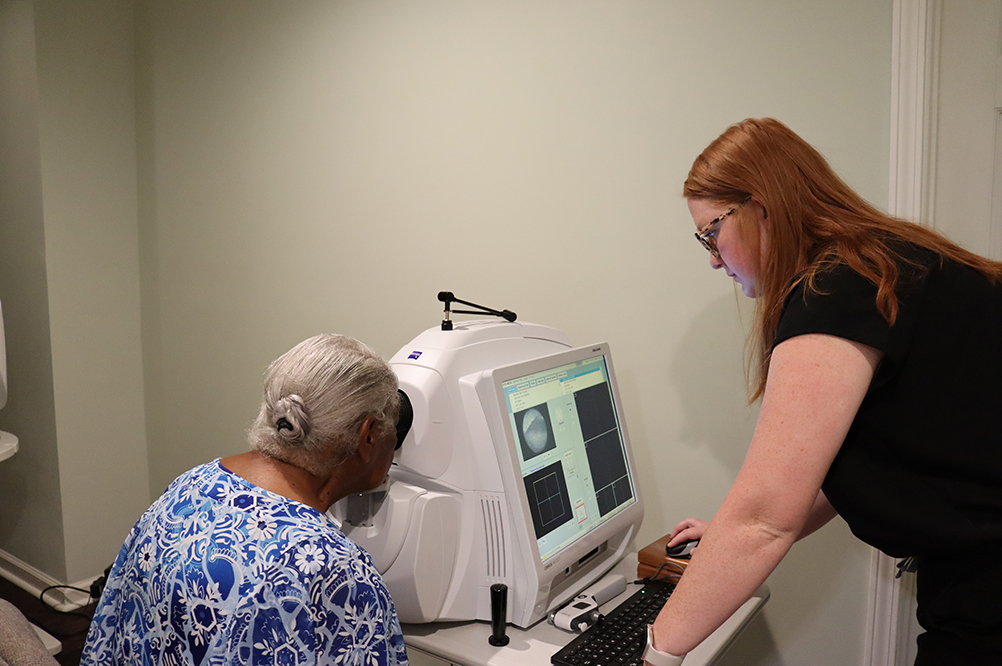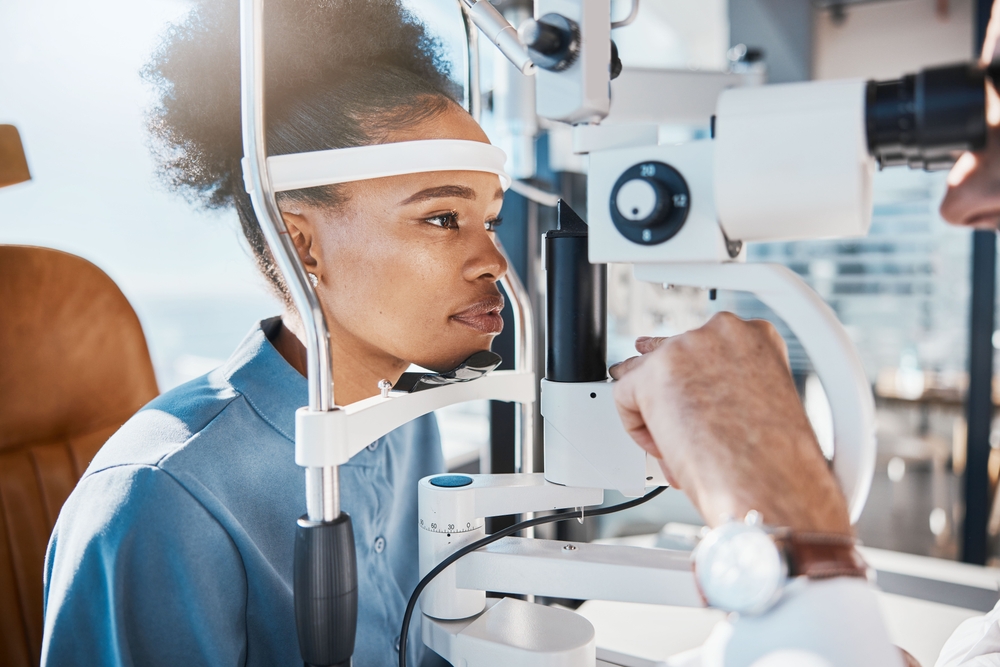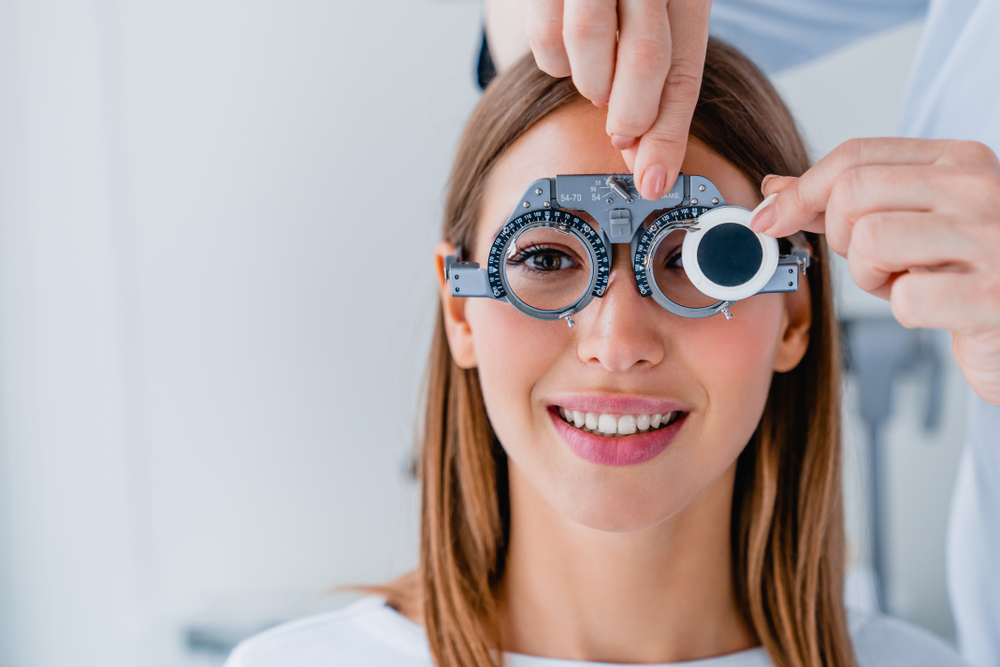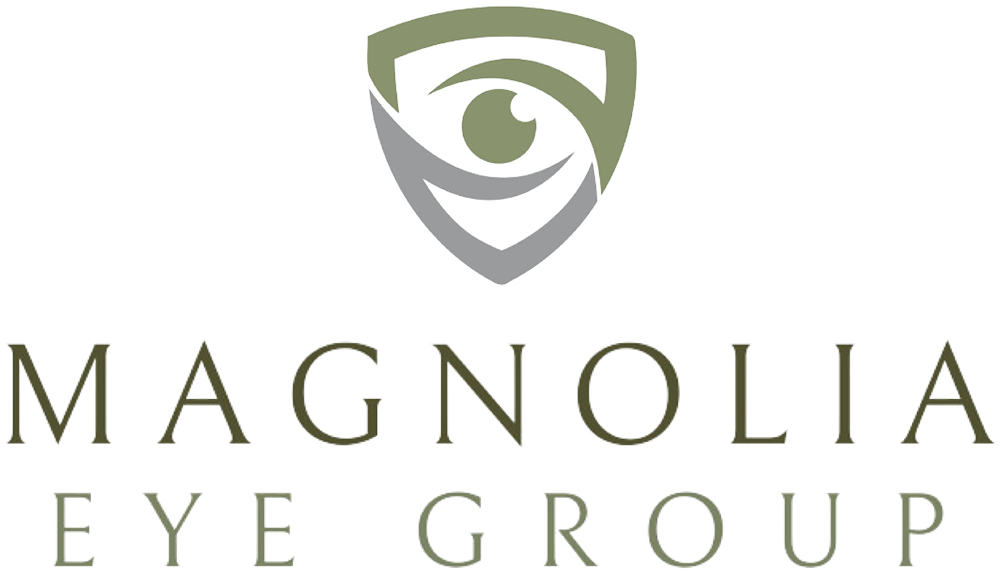Eye Exam
Your vision is one of your most valuable assets. At Magnolia Eye Group, our comprehensive eye exams evaluate ocular health while detecting potential issues before vision deterioration occurs. Our skilled team combines advanced technology with personalized attention to ensure your eyes receive exceptional care.
Eye exams are an important part of preventive health care. We provide a thorough checkup for not only the state of your vision but the health of your eyes. Visual acuity is important, but ensuring the internal and external structures of your eyes is imperative.
Read More
Regular exams allow our optometrists to look for early signs of eye disease. Many conditions that lead to vision loss do not show symptoms at first, so seeing an optometrist is your best defense against eye disease.
Our thorough approach establishes a baseline for your vision and your ocular health, allowing us to monitor your eyes over time and check for changes that may indicate eye disease. Rest assured, we’ll always explain any procedures or tests to ensure your comfort.

Understanding Eye Exam
An eye exam is a comprehensive evaluation that assesses visual acuity, eye health, and function through a series of specialized tests and observations. It includes checking vision at different distances, measuring eye pressure, examining internal and external eye structures, and evaluating how effectively the eyes work together. The examination reveals refractive errors like nearsightedness or astigmatism while screening for conditions such as glaucoma, cataracts, and macular degeneration.
Eye exams also frequently detect systemic health issues, including diabetes, hypertension, and neurological disorders, through observable changes in retinal blood vessels and optic nerves. Regular comprehensive examinations serve as preventive care, identifying potential problems before they cause noticeable vision changes or permanent damage.
The When & Why of Eye Exams
The American Optometric Association (AOA) recommends that adults aged 18-64 get a comprehensive eye and vision exam every 1 to 2 years depending on their ocular health. For adults over 65, the AOA suggests annual eye exams, as vision changes and eye conditions become more common with age.
Patients who wear contact lenses, have high prescriptions, ocular conditions, or diabetes may require more frequent exams than the general recommendations. It’s advisable to discuss this with your eye doctor to determine the most suitable follow-up timeline for your individual circumstances.
The When & Why of Eye Exams
The American Optometric Association (AOA) recommends that adults aged 18-64 get a comprehensive eye and vision exam every 1 to 2 years depending on their ocular health. For adults over 65, the AOA suggests annual eye exams, as vision changes and eye conditions become more common with age.
Patients who wear contact lenses, have high prescriptions, ocular conditions, or diabetes may require more frequent exams than the general recommendations. It’s advisable to discuss this with your eye doctor to determine the most suitable follow-up timeline for your individual circumstances.
Our Eye Exam Services
Adult and Senior Eye Exams
Mature eyes require particular attention to detect age-related conditions like cataracts, glaucoma, and macular degeneration. Our thorough examinations identify these issues early when treatments prove most effective. Magnolia Eye Group prioritizes senior care by addressing concerns about vision changes while providing solutions that maintain independence.
Children's Eye Exams
Young people depend heavily on clear vision for developmental milestones and academic success. Our kid-friendly approach uses age-appropriate techniques that make the examination process engaging rather than intimidating. Early detection of vision problems prevents learning difficulties and ensures proper visual development.
Contact Lens Exam
Contact fittings require additional measurements beyond standard eye exams. We evaluate corneal curvature, tear film quality, and conduct trial fittings to determine optimal lens options. Your lifestyle preferences factor into our recommendations for the most comfortable and effective contact lens solution.
Diabetic Eye Exams
Diabetes significantly impacts ocular health, potentially causing retinopathy and other sight-threatening conditions. Advanced imaging technology allows us to assess retinal blood vessel health and track changes over time. Our team coordinates with your primary physician to ensure comprehensive management of diabetes-related eye health concerns.

What happens during an eye exam?
When you walk into our practice, you’ll be greeted by our friendly team. If you’re a new patient, we’ll ask questions about your health history, lifestyle, and current medications. We’ll discuss your family history, give you time to ask questions and address any concerns you might have.
Comprehensive eye exams are more than just a vision test. Our questions about your health and family history help us assess your risk factors for eye diseases or other vision conditions.
Read More
During the exam, we will carefully and thoroughly evaluate both the internal and external structures of the eye using the latest technology. We will measure your visual acuity to determine whether you need corrective lenses, or if you already have them, we’ll make sure your prescription is up-to-date.
We may also assess your color vision, how well the eyes work as a team, depth perception, and the way your pupils respond to light. We use a hand-held ophthalmoscope, and a microscope called a slit lamp to examine your eyes.
Our office has invested in the most up-to-date technology for viewing the different parts of your eye. With high-resolution fundus photography and ocular coherence tomography, we can view and take images of the eye’s most important structures.
Images of your retina, macula, and optic nerve give us an up-close look at the blood vessels in these areas, allowing us to observe any anomalies. Keeping the images on file lets us look for any changes between appointments.
Keeping a close watch on your internal eye structures lets us detect eye diseases like glaucoma or age-related macular degeneration before they damage your vision.
Our Eye Exam Process
- Getting to Know Your Eyes
- Creating Your Vision Plan
- Comprehensive Examination
- Practical Recommendations
- Continuing Care
Getting to Know Your Eyes
Your first step involves discussing vision history, current concerns, and specific visual demands of your daily life. We take time to understand how you use your eyes at work, home, and during leisure activities. This detailed conversation helps us focus on what matters most for your visual comfort and clarity.
Creating Your Vision Plan
Based on your unique needs, we design a specific examination approach that addresses your individual eye health priorities. Additional tests may be included for occupational requirements or existing conditions that need monitoring. We explain each procedure beforehand so you understand exactly what to expect.
Comprehensive Examination
The core examination evaluates your vision clarity, eye muscle function, peripheral awareness, and overall ocular health. Advanced diagnostic equipment captures detailed images of your eye structures to identify potential concerns. We provide clear explanations of our findings without confusing medical terminology.
Practical Recommendations
After your exam, you’ll receive specific advice tailored to your visual needs and lifestyle. These might include techniques to reduce digital eye strain, proper eyewear care, or protective measures for your specific work environment. Small daily habits can significantly impact your long-term eye health.
Continuing Care
We’ll recommend your next appointment timing based on your specific age, risk factors, and any conditions identified. Some patients benefit from more frequent check-ups to monitor ongoing concerns. Our team is always available between visits to address questions or unexpected vision changes.
Why Choose Us for Eye Exam
At Magnolia Eye Group, we blend clinical expertise with genuine care for each patient who walks through our doors. Unlike larger chains that rush through appointments, we allocate ample time to address your specific concerns and thoroughly explain examination findings. Our optometrists participate in continuing education beyond minimum requirements, staying current with advancements that benefit your eye health. We’ve invested in premium diagnostic technology typically found only in specialty clinics, making comprehensive care accessible in a comfortable neighborhood setting.

Your Vision Deserves Expert Care
Clear vision shouldn’t wait until problems arise. Magnolia Eye Group offers same-week appointments for new patients, flexible scheduling including select evening hours, and direct insurance billing to simplify your experience.
Call us at 662-473-2181, book online through our website, or send us a direct message on Instagram to secure your comprehensive eye examination with specialists who truly see you as more than just another patient.
FAQs
How much is an eye exam?
Examination costs vary based on evaluation type, specific testing needs, and insurance coverage details. Basic comprehensive assessments typically range $75-$150, while specialized exams may incur additional fees. We accept most major vision plans and offer payment options for patients without coverage.
How long does an eye exam take?
Standard evaluations usually require 30-60 minutes, depending on your specific needs and testing requirements. First-time patients may need additional time for baseline measurements and paperwork completion. We prioritize thoroughness over speed to ensure a comprehensive assessment.
How often should you get an eye exam?
Adults with healthy eyes typically benefit from examinations every 1-2 years, while children should follow milestone-based schedules starting at 6 months of age. Those with diabetes, hypertension, a family history of eye disease, or contact lens wearers often require more frequent evaluations based on individual risk factors.
What is refraction in an eye exam?
Refraction determines your precise lens prescription by measuring how light bends through your cornea and lens. During this assessment, you’ll view an eye chart through different lens combinations while providing feedback on clarity. This process identifies refractive errors like nearsightedness, farsightedness, or astigmatism that require vision correction.
How long do eyes stay dilated after an exam?
Most patients experience dilation effects for 4-6 hours, though some notice impacts lasting up to 24 hours, depending on drop type and individual factors. During this period, you’ll likely experience light sensitivity and near-vision blurring. We provide disposable sunglasses and recommend arranging transportation following dilation procedures for your comfort and safety.
